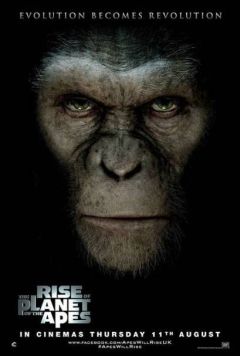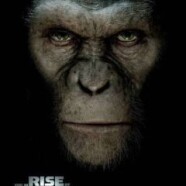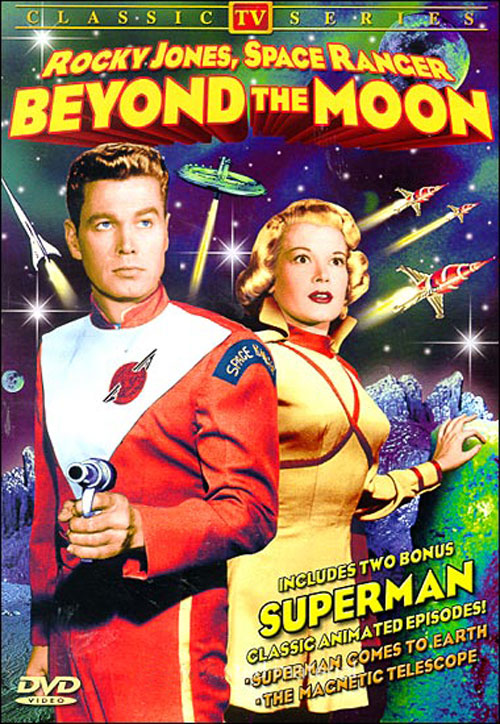Review: Rise of the Planet of the Apes
 The best science fiction throughout the generations examines the undercurrents of the human experience. It examines our hopes. It plays on our fears. It propels our dreams and makes us face our demons head-on. There was a time not so long ago when filmmakers could bring that experience to us on the silver screen. Somewhere along the lines, perhaps in the 90s this time around (?), Hollywood decided we as a race didn’t need to think, that special effects are all that were needed to draw audiences. And maybe that worked, until the advent of quality and affordable home theater. Today, Hollywood tells us it’s in trouble, that audiences aren’t going to the movies, that they must bribe us with cheap gimmicks and name recognition. In other words, everything seems to be about remakes, reboots, and re-imaginings… and of course, it must be in 3-D. That’s right, ladies and gents: the 1950s have returned! Make sure you have your tinfoil helmets in place, and prepare to duck and cover!ÂÂ
The best science fiction throughout the generations examines the undercurrents of the human experience. It examines our hopes. It plays on our fears. It propels our dreams and makes us face our demons head-on. There was a time not so long ago when filmmakers could bring that experience to us on the silver screen. Somewhere along the lines, perhaps in the 90s this time around (?), Hollywood decided we as a race didn’t need to think, that special effects are all that were needed to draw audiences. And maybe that worked, until the advent of quality and affordable home theater. Today, Hollywood tells us it’s in trouble, that audiences aren’t going to the movies, that they must bribe us with cheap gimmicks and name recognition. In other words, everything seems to be about remakes, reboots, and re-imaginings… and of course, it must be in 3-D. That’s right, ladies and gents: the 1950s have returned! Make sure you have your tinfoil helmets in place, and prepare to duck and cover!ÂÂ
But that’s the big difference between now and then, isn’t it? Instead of nuclear proliferation, our fears are instead turned to the unseen specter of biological warfare, not so much because it is paramount on our minds, but because Hollywood says it’s what we should fear. It all seems to be about uncontrollable plagues, which usually (but not always) seem to lead to zombie apocalypses. When the 50s gave way to the 60s and the nuclear scare gave way to civil rights and Vietnam, there was a little movie released in 1968 that was the Star Wars of its time, featuring big-shot award-winning actor Charlton Heston: Planet of the Apes. How popular was it? After a 2-year break, it produced 4 sequels in 4 years, then a TV series, an animated series, a handful of made-for-TV movies, and all the merchandising you might expect for a pre-George Lucas world. It was the largest prosthetic makeup effects movie anyone would see until Star Trek VI gave us dozens of Klingons, and even that falls short of the mark by comparison. I guess that what zombie movies are for now. Regardless, Planet of the Apes was an instant classic, one of those movies that even the non-sci-fi crowd admitted to enjoying. Given Hollywood’s track record, which was the same even then as it is now, it was inevitable that some big-name director would come along and remake it sooner or later, which Tim Burton did a decade ago. I think we can all agree that, love it or hate it, Burton completely missed the target in his updated version.
When I first saw the trailer to Rise of the Planet of the Apes, I instantly wanted to hate it. I rolled my eyes back in my sockets far enough to see my own brain. My dedication to the classics is pretty much well-known by now, and there’s nothing that sickens me more than when someone comes along claiming to respect an original without offering proof of such respect when the final product is released. Somewhere along the lines I started thinking that this prequel (why do we hate that word so much, really?) would set up Tim Burton’s Apes.  And as I constantly say, I vote with my dollar. There are times, however, when the circumstances of life override your dedication to fighting the system. Fate intervenes, and you find yourself at the movie theater against your better judgment, hoping beyond hope that the movie you are about to see hasn’t simply strip-mined your happiest memories yet again. And if you’re reading this, you’re probably thinking to yourself that this is a really long-winded way of saying “I finally saw this movie.â€Â Get on with itâ€â€I hear ya.
Sci-fi fans are all-too-familiar with the tried-and-true formula. It’s the backstory for The Terminator. Or The Matrix. Or Frankenstein. Or any number of other stories dating back to time immemorial where humanity’s quest for knowledge, fueled by curiosity or altruism is perverted by a higher-controlling authority within the scientific community and/or the military for financial greed or world domination. In this case, James Franco plays Will Rodman, whose father Charles (John Lithgow) is rapidly deteriorating from Alzheimer’s. Rodman’s quest is, as expected, to find a cure, which manifests as the plotonium known as ALZ-112. 112 has the side effect of being passed on genetically, and newborn chimp Caesar is spirited away to live with Rodman in secret so that his quest can continue. When 112 is proven effective, in spite of complications, 113 immediately goes into development. And as one might expect, Caesar’s existence is revealed through an act of protection that is misconstrued as an animal attack, forcing Caesar back into captivity with other apes. There’s absolutely nothing in the plot or circumstances that isn’t exactly on-formula. There are no surprises to be had.
That’s what I would have thought, but there are two surprises. The first is the performance of Andy Serkis, whose work I’ve admired since his portrayal as the doomed Gollum. The man’s depth of physical performance astounds me. He gives everything he’s got in turns of expression and body language, all of which are transferred with extreme care by the special effects team. This man should be swimming in Oscars by now.
The second surprise is what I call the Fanboy Effect. This is where the director pays homage to the original in all respects without being tongue-through-cheek about it. The homage to the original Apes becomes the very foundation of this story, rightfully so since that’s the entire point. There are a couple of things that don’t immediate add up, but the direct line to the Heston classic makes itself known in so many ways that I found myself geeking out over the tiniest little details. Details like Heston himself making a brief appearance. Don’t even pretend you saw that coming! And there are a lot of other easter eggs and not-so-subtle nods to find, up to and including the seeds of the entire social structure for Ape civilization. For those who haven’t seen the original, you don’t feel like you’re missing anything. The movie is clearly leading to the next level, which rather than another remake of the original, I hope it to be the next stage in the Ape takeover. Caesar seems to be a benevolent leader for his army, but there are malcontents within the ranks. There are always malcontents in the ranks, for this is the stuff of sequels that lead to franchises… and Apes is a proven brand name, provided they don’t drive it into the ground a third time.
Rise of the Planet of the Apes does what it does very well. It entertains. It speaks to the world of geek and non-geek alike. It tells a solid story with solid characters. It delivers impressive action and top-of-the-line special effects as a summer tentpole movie should. It doesn’t apologize for being a prequel. It doesn’t surrender to the Fanboy Effect and fall flat on its face because of the endless geek references. And it doesn’t sugar coat the message. While you sit back and enjoy your popcorn and sodas, you are once again fed the warning that humanity is screwed up. But if the powers that be would listen to the wisdom of the storytellers, we still have a chance to save ourselves. We never listen, do we? The Geek Utopia that is Roddenberry’s vision of Star Trek will likely never arrive because there is too much greed and malice and coveting of power to be had in the world. The “chosen few†will die amongst the masses, the survivors waking up to a new reality as humanity bows in supplication to our new masters. And formula demands that in the midst of such oppression, many years from now, a hero will rise, shouting those immortal words:
“Get your stinking paws off me, you damned dirty ape!â€Â
Yes, Rise was that good. I had to go home right after the credits rolled so I could watch the original again. What? Isn’t that the way it should be?
Follow Us on Twitter @SciFiFX
Like us on Facebook: www.facebook.com/scififx











